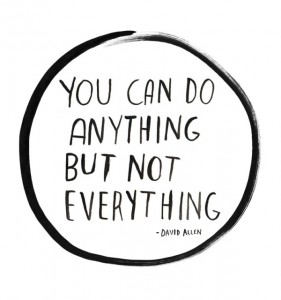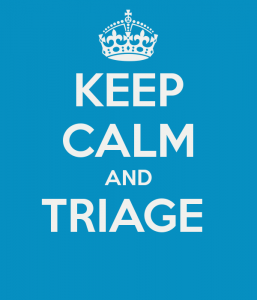tri·age
trēˈäZH
noun
1.
(in medical use) the assignment of degrees of urgency to wounds or illnesses to decide the order of treatment of a large number of patients or casualties.
verb
1.
assign degrees of urgency to (wounded or ill patients).
A few years ago, a nurse told me, “You need to learn how to triage.” She was referring to my schoolwork and life balance using terminology from the hospital. Triage is the process of determining the urgency of a patient’s condition and prioritizing all patients by immediacy of need for transportation and care. For example, someone with an injury to their vital organs will obviously be prioritized above someone with a broken wrist. The nurse was the mother of someone close to me, and I was insulted because I thought she was criticizing my priorities and goals as being wrong. In retrospect, I realize what she saw: a stressed out college student who had no time for anything but school, starved of any fun and relaxation.
Ever since, I’ve been experimenting with how I prioritize time and goals. Sometimes I’m still not certain I’ve got it “right,” but I think this is true for everyone: balance is not a tidy endpoint with a bow on it. Life is always throwing us curve balls, and even when we see them coming we’re not always prepared for the blow. Priorities change, circumstances change, and our goals and estimations of what will make us happy change. And finding the right balance between the many facets of wellness, from exercise and diet to confidence and self presentation, relationships, sleep hygiene, and mental health—on top of the rest of life (family, chores, school, work, and other responsibilities) is a process and a challenge. But there’s also no feeling like equilibrium. You will genuinely feel healthier, happier, more energetic, and more peaceful when you find it, whatever that equilibrium looks like for you.
In this eternal pursuit of balance, I’ve been learning how to triage. It seems simple and obvious in the context of a hospital and physical injuries, but it can be harder to do with school. Some instances are easy: Say you have a chemistry exam and a French quiz on the same day. The chemistry exam is worth 30 percent of your grade for the course, while the French quiz is 10 percent. You have a limited amount of time to study. Which one do you prioritize? For high-aiming achievers, making these kinds of judgments is inherently stressful because everything feels like a #1 priority. I’ve learned a few effective steps for prioritization that have helped me be a calmer, happier, healthier person, and I hope they help you too!
1. Write down all the tasks you need to get done
The list might look overwhelming at first, but having a physical copy of your tasks allows you to sort through them visually. In your brain, they’re all floating around with equal weight. On paper, they become concrete things that can be ordered and reordered.
2. Triage!
Which obligation is going to metaphorically bleed out and die if you don’t see to it immediately? Which one is an extremity that needs stitches, but not urgent? Assess which tasks need to be completed sooner than others based on time constraints.
3. Consider tasks based on value
If your long term goal is to get a certain grade in a class, then in general it makes sense to do the reading for that class consistently instead of hitting the gym every single day. But now and then you might really need a sweat sesh or an endorphin boost, and if that’s going to be more valuable by upping your mood and energy, it might be worth it to skim through that night’s reading.
4. Consider tasks based on effort
With tasks that have comparable value, estimate how much effort each task will require. Start with the more difficult task first. That way, when you’re losing steam, you’ll still be able to make it through the easier tasks leftover.
5. Accept the limitations of reality
There will be instances where you simply won’t be able to do everything on the list and something needs to go. After you’ve made your time and value estimates for your task list, eliminate the ones you know you can’t get to that day and give your all to the things you can.
I hope these prioritization tips help bring you balance and peace of mind in your pursuit of wellness, success, and happiness! Please share this chapter and these pointers with anyone you think might benefit from them. Though heavily modified from any canonical origin of the Buddha’s teachings, I do appreciate the popular quote, “Thousands of candles can be lighted from a single candle, and the life of the single candle will not be shortened. Happiness never decreases by being shared.” So it is with wellness. Sharing will never decrease your own. Go forth, share, flourish, and delight in your life!
By Sofia Lerner
Sofia Lerner is a Campus Clipper publishing intern who is studying English as a senior at NYU. Passionate about literature, dance, and wellness, Sofia aspires to help the arts thrive and help others pursue healthy lifestyles. For over 20 years, the Campus Clipper has been offering awesome student discounts in NYC, from the East Side to Greenwich Village. Along with inspiration, the company offers students a special coupon booklet and the Official Student Guide, which encourage them to discover new places in the city and save money on food, clothing and services.
At the Campus Clipper, not only do we help our interns learn new skills, make money, and create wonderful e-books, we give them a platform to teach others. Check our website for more student savings and watch our YouTube video showing off some of New York City’s finest students during the Welcome Week of 2015.




